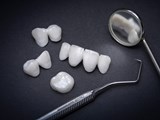I want veneers so what is the procedure? How does this work?
Let me tell you it's a little bit more intensive than the majority of treatments, but that's because it's for aesthetics, you want to get an amazing aesthetic result.
You don't want to put these veneers on and end up with bucked teeth and look all like bugs bunny or whatever. It is very important to get this done precisely correct so you're happy with your result.
So how does it work? Typically, at our clinic, you'll come in we'll take x-rays, we'll take pictures, we'll make sure everything looks all nice and pretty we'll talk to you about your outcomes.
Potentially you've seen some teeth that you really like and you're saying: "hey, is this possible?"
We kind of go back and forth and check to see if it's good and then we'll take an impression of your mouth and we'll send it off to the lab.
Why do we do that? Because the lab will give us a model of what your teeth can look like, and we do this because it's super easy to modify it at that point. Not so easy to modify it when we're about to cement it, so you get it!
Your second visit you come back, you say "hey, is this is what the teeth are going to look like?" we ask "What do you think?" and you're going to go "Oh, this looks really good, but you know that edge, I thin that's too sharp or not sharp enough, and this tooth is too long or short."
We make the adjustments, we send it back to lab, get it back. Okay, cool the next time. We look at it, we say this looks really good and then the dentist goes if you're happy with this, I'm going to start preparing your teeth. So we will know that if you want it to look like this, we have to prepare x amount and that's how it works.
You can't just go into the clinic and say cool, I want my veneers and the dentist to start preparing it for the next visit. That's not a good way to do it for most dentists. That's super rare that it works like that.
Most of the time you come in, we take the impression get it back judge it. We want to give the thumbs up. Then we send it back to the lab for the permanent ones in general, you're going to have at least three visits.
First visit you come in, we talk, you take an impression, send to the lab.
You come back. We have the mock-up of what it looks like. You think, everything's good, we start preparing the teeth at that time and then you will actually walk out that visit with temporary veneers, not your permanent ones, temporary ones.
So they'll look pretty good, but they definitely won't look as good as the final results, then you go OK and we send it off to the lab. The lab gives us back the permanent ones.
You come back in for your third visit at least right there, maybe more, depending on how many back and forth do you go with the lab your third visit and we cement those we actually kind of put them on the teeth to make sure you're happy first and then we cement them and that's it.




